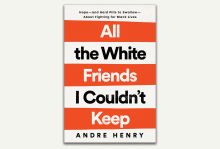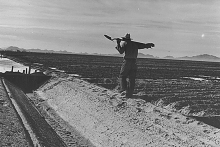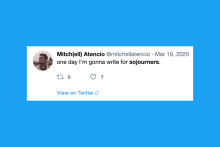Arts & Culture

Men uses imagery from Genesis 3 to reflect on the culturally assigned guilt of women and the patriarchal system that has perpetuated this guilt through a centuries-long history of interpretation.

Lessons on life, staying afloat, and 10 articles our editors are reading this week.

All the glory Kendrick Lamar has received for his three Grammy Album of the Year nominated works of Christ-influenced, socially conscious rap masks a difficult truth: To be a fan of his music, you have to disregard its desecration of women.

Two films in theaters right now ask if we can find some way to escape the madness of our reality and find something better. Sounds pretty nice, doesn't it?

ONCE I HAD a dream that I was walking along the beach with my Lord. I felt self-conscious about wearing a two-piece swimsuit, but I didn’t know the Lord was going to be at Rehoboth Beach during spring break.
God said, Don’t worry about it, Jenna. Purity culture is so 2008.
Suddenly, scenes of my life flashed before me along the shoreline. I looked back at the footprints in the sand. In most scenes, there were two sets of footprints: Mine and God’s. God is a size 8.5 and has high arches, in case you were wondering. But then I noticed something troubling. At many of the hard times in my life, there was only one set of footprints.
When I needed you the most, why did you leave me? I asked God, with more sass than I’d like to admit. God whispered something in return, but I couldn’t hear the words. It’s really loud at the beach, and there was a sand volleyball game nearby. So then God yelled, I never left you! When you saw only one set of footprints, that was when I carried you.
I was so relieved. Sorry for the mix-up, I said to God. I also wear size 8.5, so I was confused.
But then I noticed something even more troubling.

The chickens have a meanness I cannot quell
though I thunder from the kitchen window, a god
of rice and oats. No matter how much I scatter
in the cardinal directions, there is bullying,
the Silver Laced Wyandottes the worst despite their name.

AUSTIN CHANNING BROWN, author of I’m Still Here: Black Dignity in a World Made for Whiteness, posted once that she didn’t need “more friends” but rather wanted “partners in the struggle for justice.”
As a white Midwesterner, I’d thought of racial injustice as an individual problem—individuals not liking other individuals who didn’t look like them. Therefore, the answer to racism was friendship. I worked at churches that celebrated calls to the common table in worship, absent confession or repentance, to sanctify my individualistic take on race. Brown’s words shook me—this activist wants co-laborers, not friends? What even is the work if it’s not friendship?
While Andre Henry is Black and grew up in the South, he and I were raised on the same milk of individualistic race relations. In his debut book, All the White Friends I Couldn’t Keep, Henry narrates his journey out of the “colorblind” evangelicalism of his childhood to being an artist, activist, and community organizer for systemic racial justice.

WHISPER NETWORKS. The Greek muses. Immigrant aunties. Women, in groups, are loud and gripping storytellers. Daphne Palasi Andreades’ debut Brown Girls confirms this. In eight immersive sections, the novel chronicles the coming-of-age of the titular brown girls, mainly second-generation immigrants raised in the “dregs of Queens” (N.Y.).With the first-person plural narration, we follow a chorus that aims to reclaim the voices they lost at various junctures in their lives. After all, what demands a shout if not systemic silence?
The brown girls experience erasure early. Their teachers mistake Michaela for Naz, Nadira for Anjali. They snap at Sophie who is Filipino, but call her Mae, who is Chinese. To mold themselves into girls who are worthy of visibility, the brown girls begin to erase themselves. They lighten their skin. They quiet their rage. After middle school, education takes some of them away from Queens. They wrestle with the changes it brings. “Dutifully, we reposition our tongues,” they tell us. “Even in song, we become fluent in the language of our colonizers. Our English, impeccable. Our mother tongues, if we were taught them at all, become atrophied muscles, half-remembered melodies.”

“DO NOT LOOK AWAY. Do not avert your gaze. Do not turn aside.” These words met me a few weeks ago via ecologist Joanna Macy’s ever-relevant book World as Lover, World as Self. I love these words, even though their charge is not an easy one. Looking at what is, without turning away, without aversion, takes incredible strength of will, especially in a culture that banks on our inability to pay attention or handle despair. Nonetheless, for Macy, the illumination of sustainable futures is impossible without first facing our grief. Which brings me, in an extremely roundabout way, to Jane Campion’s film The Power of the Dog and Lorde’s 2021 album Solar Power.

Biased History
Wanting to understand the enduring power of the myth of the Confederate “Lost Cause,” comedian CJ Hunt expanded what was originally a satirical internet video into an insightful documentary. Set against the New Orleans City Council’s 2015 vote to take down four Confederate monuments, The Neutral Ground explores hard truths of our nation’s past. ITVS.

MEILIN LEE, the 13-year-old hero of Pixar’s Turning Red, has a lot on her shoulders. She’s maintaining perfect grades alongside responsibilities helping her mom, Ming (Sandra Oh), run Toronto’s oldest Chinese temple. She’s torn between her identities as a dutiful daughter and a socially active teenager. Oh, and she transforms into a giant red panda in times of strong emotion.
That last issue, it turns out, is genetic. Because of a deal made by an ancestor, the women of Meilin’s family all poof into red pandas when they’re angry, sad, or excited, a trait that emerges during puberty. The panda spirit can be contained through a ritual. Ming is desperate to keep her daughter’s red panda spirit under control. Meilin, however, isn’t sure she wants it subdued.
Directed and co-written by Chinese Canadian animator Domee Shi, Turning Red’s fuzzy transfiguration is a metaphor for real-life stressors.

This week has been one where loss seems as close as it might ever be — losses significantly more important than tennis matches. Thinking of politics as sports is deeply unhealthy but understanding and identifying when we are losing is important. Loss is never inevitable, but neither is victory.

Teresa Kim Pecinovsky's Mother God and Christena Cleveland's God Is a Black Woman offer different portraits of a feminine God whose powerful love reshapes the world.

The show is based on Jon Krakauer’s 2003 book of the same title, detailing the brutal 1984 murder of a woman and her infant baby by two brothers from the Lafferty clan, a prominent family in the Church of Jesus Christ of Latter-day Saints.

Through the years, we’ve written about the ways churches can help workers — and the way workers can help the church.

The Bad Guys asks viewers to check their biases and assumptions about who is “good” and who is “bad.”

Twitter is a strange thing — if it’s any singular thing at all. If it does come to an end, I hope we’ll look back reflectively and carefully, learning from what we got right, what we got wrong, and growing into the future.

Jesus rose on Sunday, but my heart is stuck in Lent.
Last week my church gathered our first in-person Holy Week services since before the pandemic. We sung Charles Wesley’s classic Easter hymn, “Christ the Lord Is Risen Today,” our trailing alleluias slightly out-of-sync as we remembered how to blend our voices. But when we got to the line, “Where, O death, is now thy sting?” the words stuck in my throat. Love’s redeeming work is done — I do believe that — but fresh examples of death’s sting aren’t hard to spot.

While Rethinking Sex maintains a nearly secular perspective throughout, toward the end of the book she draws on 13th-century theologian Thomas Aquinas’ definition of love, which is that we should be “willing the good of the other” and creating goodwill in our relationships and interactions with other people.

On the IRS Form 1040, there is a section titled “Third Party Designee” which asks, “Do you want to allow another person to discuss this return with the IRS?” When filling out my 1040 for 2021, I simply wrote, “Jesus paid it all, all to him I owe.” This is what people mean when they say, “let go and let God,” right?